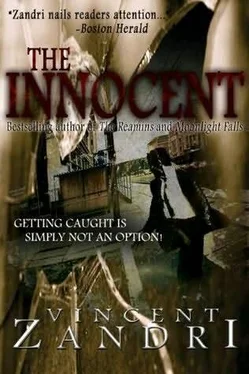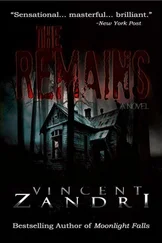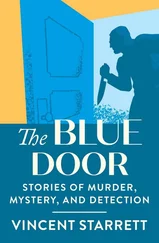“I’m supposed to take your word for it?”
“What can I say? You either believe me or you don’t or you shoot me in the belly right here or you fucking leave my office.”
“Sure,” I said.
Norman poured another shot. He took a swallow from the cup, set it down on the desk, not hard.
“My hands are tied,” he whispered.
“Who set the knots?”
“I’m not exactly at liberty to say.” He took another drink.
I reached across his desk, grabbed the brandy bottle, poured myself a second shot. I drank it down, felt the cool heat of the liquid coat the inside of my gut.
“What more can I do for you, Keeper?”
I set the mug back down on the desk. I wanted nothing more to do with it.
“You can help me get out of this mess and then you can help me bring Pelton down.”
Norman took hold of his mug, sat back in his swivel chair. The light coming from the desk lamp in his otherwise black office made his face glow like a ghost’s. At the same time, something inside told me that Norman was truly on his way to becoming a ghost.
“Try again, Keeper.”
“At least fill me in on what happened yesterday afternoon.”
I sat down, crossed my legs, and waited for Norman to talk.
He took a deep breath and looked into his mug.
“This plainclothes cop came by only a few hours after you left to go back to Stormville. What the hell was his name?” He opened his desk drawer, scanned the contents, and pulled out a business card. “Schillinger,” he said. “Detective Martin Schillinger, Stormville PD. Big, beefy goofball of a guy in a trench coat; same guy you told me about yesterday.”
“My arresting officer,” I said.
“Well, he wasn’t alone. He had an entourage with him. No one I recognized. He said he had reason to believe I was harboring evidence of some kind that was crucial to the recapture of Eduard Vasquez.”
“What’d you tell him?”
“What do you think I told him? I told him I didn’t know what he was talking about. That I had only just heard about the Vasquez escape. How could evidence have possibly made it up to my office that fast or at all for that matter? Then he asked me to follow him downstairs to the crime lab.” He took another drink, emptying out his mug so that the word NOT! was clearly visible on the bottom.
“You followed.”
“You’re damn right I followed. Listen, Keeper, you’ve been in Corrections most of your life, so I’ll spare you the gory details, but are you aware of new SOPs on printing analysis?”
I shook my head no, even though I was somewhat cognizant that fingerprint technicians were becoming real scientists with ultraviolet light-enhancement processing and microscopic imaging. That sort of thing. But as far as any actual procedures went, I didn’t know much. It just wasn’t part of the warden’s job description.
“When the stuff you gave me was sent down to the lab, it would normally have been tagged and bagged and logged in on the computer with both the state and the FBI as admissible evidence. Only this time I worked off the record. No tagging, no bagging of any kind. Just analysis.”
“No registering with the proper authorities,” I said. “No way for Stormville PD to know about the stuff unless there was a leak.”
“I promised you I’d do this under the table,” Norman said, pouring one more drink, “and that’s what I set out to do. Now here’s the kicker. Somehow this clown…”
“Schillinger.”
“Somehow Schillinger knew what to look for and where to find it in the lab.”
“Informant,” I said, lighting a cigarette. “Squeaky technician.”
“No way,” Norman said.
I released a cloud of blue smoke that boiled in the light from the desk lamp and then disappeared into the darkness.
“Could have been anybody in the lab,” I said, getting up from the couch. “Let’s go pay a visit.”
Mike stood up fast.
“Keeper sit down!” he barked. “You go traipsing through there, you get the whole place in an uproar.”
I sat back down. So did Mike. In the end, I suppose he was right. I had to be careful about shooting my mouth off or making any false accusations. Maybe on one hand I had trouble believing he was giving me the truth. On the other hand, I had no real reason not to believe him.
“Those folks downstairs,” Mike said, “they’re scientists, techies. They got no reason in the world to turn informants. They’re like machines, extensions of their scopes and lasers.”
“Money,” I pointed out. “Money talks.”
“What?”
“How much one of those crime techies make a year?”
“Probably thirty. No more than thirty, anyway.”
“How can you be sure a lab techie didn’t phone a friend of his downstate when you asked him to do the Vasquez stuff off the record?”
“I know these people pretty well, Keeper. They’re on the up-and-up.”
“And we’re not?” I said.
“You’re not,” Mike said.
An uncomfortable silence followed that I nearly filled by calling my old buddy Lieutenant Mike Norman a jerk.
“What about you,” I said. “How deep you in now?”
“Keeper,” he exhaled, holding his mug with two hands, “I’m playing dumb the whole way. Don’t ask me how that stuff got in the lab. It could’ve happened a hundred different ways. For all I know, the stuff spontaneously appeared out of the blue. Maybe aliens dropped it.”
“Aliens,” I said, stamping my cigarette out in the metal ashtray next to the base of the desk lamp. “Sure.”
Norman got up, which told me there wasn’t anything left to talk about.
A thin waft of smoke rose up from the ashtray, clouded his sunken face.
“Now get out of here and don’t come back for three years, Keeper. I’m sorry, man, but a pension’s a pension, and you’re a hot ticket these days.”
I stood up and took a look at the calendar tacked to the wall behind him. The entire first week of May was close to being x-ed out. Soon he’d be working on the second week.
I went for the door.
“Keeper, wait,” Mike called out.
I turned.
“Sorry it went bad.”
“Lots of people sorry these days, Mike. Me included.”
He put his hands on his hips. His.9 millimeter Glock was stuffed up under his left armpit. His armpits were soaked with sweat and his white shirt stuck to the sides of his ribs.
“Maybe I should have gone right to the Stormville cops,” I said, “instead of taking matters into my own hands. It’s just that I knew Robert Logan’s statement was a phony.”
“Tell you what, Keeper,” Mike offered, going for the door. “When this thing blows over, we’ll go to lunch. We’ll do something better than Jack’s, something a little more personal. We’ll do Italian in your honor. How about Mama Citones on Quail Street?”
“William Kennedy’s hangout,” I said. “Pulitzer Prize-winning pasta.”
Mike tried to work up a smile.
“I’ll be counting the days until this thing is finished and you’re off the hook.”
“Hey,” I said, taking one last glance at the x-ed-off calendar behind his desk, “I like my job, too.”
I forced a smile, but I wouldn’t call it a happy smile. Because I knew then, for certain, that my old Attica buddy Mike Norman was a liar.
BUT THEN, NORMAN HADN’T always been a liar. Once upon a time, he was a happy-go-lucky young kid trying to make a name for himself in the Department of Corrections. We all were like that-Norman, Pelton, and me. Cocky, young, crazy. Lucky, for God’s sakes. And get this: We’d set out to make a difference in the lives of those prisoners. Until September of 1971, that is, when the prisoners made all the difference in our lives.
Читать дальше












